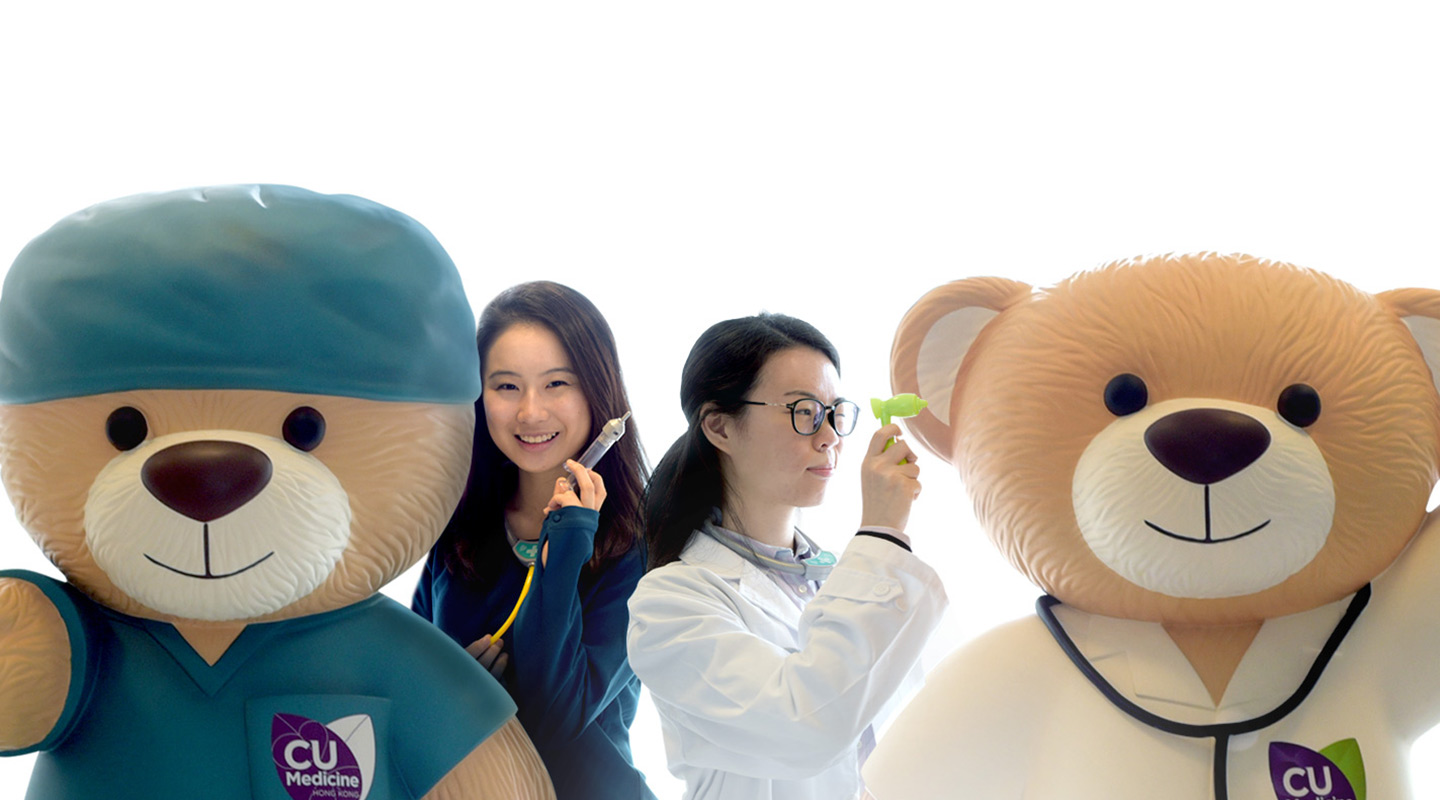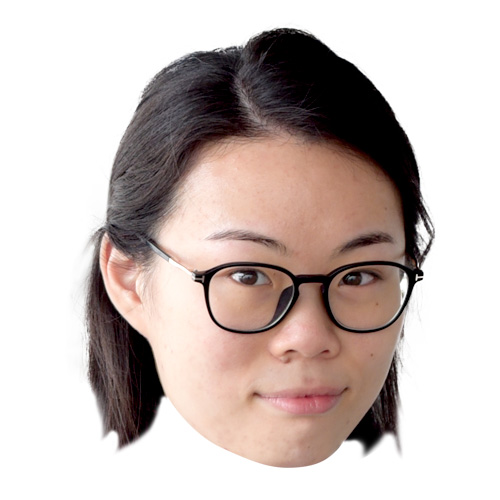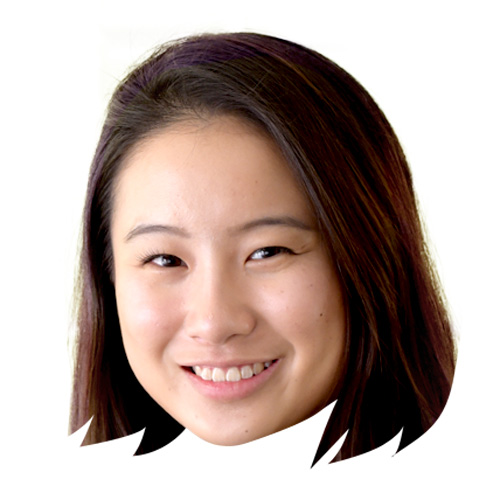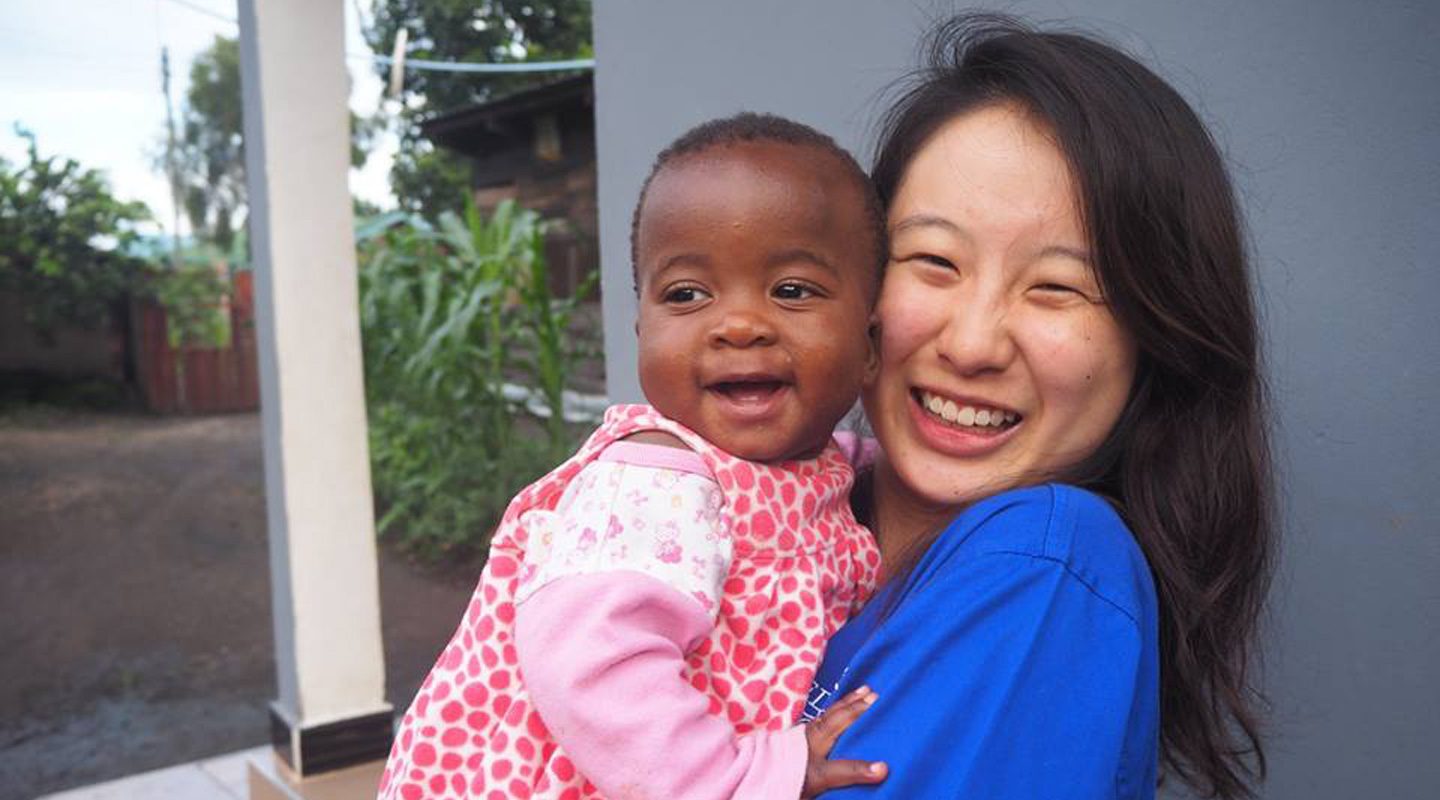Dear readers, With the launch of e-newsletter CUHK in Focus, CUHKUPDates has retired and this site will no longer be updated. To stay abreast of the University’s latest news, please go to https://focus.cuhk.edu.hk. Thank you.
Candy Kang and Nicole Tanner’s Journey in a Top Programme

Candy Kang (Year 6) & Nicole Tanner (Year 5)
Did Medicine choose you or vice versa?
 : I chose it, but it’s not my first choice. Being extremely curious about how the human brain works, I chose psychology upon entering university. After a few weeks, I found that psychology could not satisfy my curiosity and realized that it might be better to study the organs related to the human mind from the physiological perspective. So I transferred to medicine.
: I chose it, but it’s not my first choice. Being extremely curious about how the human brain works, I chose psychology upon entering university. After a few weeks, I found that psychology could not satisfy my curiosity and realized that it might be better to study the organs related to the human mind from the physiological perspective. So I transferred to medicine.
 : I was seven when SARS broke out in Hong Kong. How doctors brought hope to the city in distress impressed me and I made up my mind then to become a doctor. My dream has remained unchanged for 14 years. I have chosen Medicine and the converse is also true. As I was not academically outstanding when I was small, I kept telling myself that I needed to work much harder if I wanted to enter the medical school.
: I was seven when SARS broke out in Hong Kong. How doctors brought hope to the city in distress impressed me and I made up my mind then to become a doctor. My dream has remained unchanged for 14 years. I have chosen Medicine and the converse is also true. As I was not academically outstanding when I was small, I kept telling myself that I needed to work much harder if I wanted to enter the medical school.
It is said that GPS students are the cream of the crop. Are you?
 : It depends on how you define it. All I know is I am very critical of myself, of how I do things, of the value of what I do, and of the impact I can bring to people and society with my trivial achievements.
: It depends on how you define it. All I know is I am very critical of myself, of how I do things, of the value of what I do, and of the impact I can bring to people and society with my trivial achievements.
 : Not really. There are so many people smarter than me. Medical students are usually strong in logical analysis, while I am more of a creative person. I love to create new projects and GPS offers me ample opportunities in this aspect.
: Not really. There are so many people smarter than me. Medical students are usually strong in logical analysis, while I am more of a creative person. I love to create new projects and GPS offers me ample opportunities in this aspect.
Please tell us something about your overseas experiences in the past few years.
 : I’ve been to Cambridge for nine weeks in the summer of 2016 working in a laboratory run by Prof. Vincent Mok's research partner. I helped in doing DNA research on a kind of hereditary stroke disorder rarely found in Hong Kong. It exposed me to new research methodologies and pointed to new possibilities. The next summer I spent two months in a children’s hospital in Boston, studying the regeneration of damaged cells of animals.
: I’ve been to Cambridge for nine weeks in the summer of 2016 working in a laboratory run by Prof. Vincent Mok's research partner. I helped in doing DNA research on a kind of hereditary stroke disorder rarely found in Hong Kong. It exposed me to new research methodologies and pointed to new possibilities. The next summer I spent two months in a children’s hospital in Boston, studying the regeneration of damaged cells of animals.
 : Sponsored by a scholarship, I was attached to the University of Sydney studying liver disease, and presented a study on childhood asthma at a conference in Milan. I also undertook a paediatric attachment at Imperial College London. I attended a conference on startups in Silicon Valley, San Francisco in February to learn about the latest development of social enterprise and AI. I went to Tanzania in April for an attachment at a suburban hospital, to observe the healthcare system in a developing country.
: Sponsored by a scholarship, I was attached to the University of Sydney studying liver disease, and presented a study on childhood asthma at a conference in Milan. I also undertook a paediatric attachment at Imperial College London. I attended a conference on startups in Silicon Valley, San Francisco in February to learn about the latest development of social enterprise and AI. I went to Tanzania in April for an attachment at a suburban hospital, to observe the healthcare system in a developing country.

Who are your mentors and how are your relationships with them?
 : My caring mentor is Prof. Martin Wong who is an expert in public engagement. I did not find public health important or interesting until I took part in Professor Wong's research. My project mentor is Prof. Vincent Mok, a neurologist. He treats students as adults and is always ready to share with us his research findings. He would take us to conferences and seminars to widen our experience. I have learnt so much by observing how he leads and influences his profession, and how he manages a large-scale laboratory with poise. The two mentors are both amiable and accommodating. What I get from them is far more encouragement than pressure.
: My caring mentor is Prof. Martin Wong who is an expert in public engagement. I did not find public health important or interesting until I took part in Professor Wong's research. My project mentor is Prof. Vincent Mok, a neurologist. He treats students as adults and is always ready to share with us his research findings. He would take us to conferences and seminars to widen our experience. I have learnt so much by observing how he leads and influences his profession, and how he manages a large-scale laboratory with poise. The two mentors are both amiable and accommodating. What I get from them is far more encouragement than pressure.
 : My caring mentor in Year one was Prof. Vincent Mok. We met monthly and talked about daily life and adaptation to university. He encouraged me to find where my passion lies, and let me participate in his brain research. He also suggested me to engage in community service, so I followed Prof. Emily Chan’s CCOUC delegation to Sichuan in 2014 for post-flood relief. My project mentors include Prof. Simon Ng whose expertise is in surgery, which is one of my interests; Prof. Albert Martin Li who paved the way for my attachment in London and kept weekly communication with me to check on my progress and give me sound advice on my career path; Prof. Justin Wu who has given me countless advice during my GPS journey; Prof. Henry Chan and Prof. Vincent Wong who thoughtfully arranged an attachment in Australia for me; and Prof. Philip Chiu who connected me to Stanford University.
: My caring mentor in Year one was Prof. Vincent Mok. We met monthly and talked about daily life and adaptation to university. He encouraged me to find where my passion lies, and let me participate in his brain research. He also suggested me to engage in community service, so I followed Prof. Emily Chan’s CCOUC delegation to Sichuan in 2014 for post-flood relief. My project mentors include Prof. Simon Ng whose expertise is in surgery, which is one of my interests; Prof. Albert Martin Li who paved the way for my attachment in London and kept weekly communication with me to check on my progress and give me sound advice on my career path; Prof. Justin Wu who has given me countless advice during my GPS journey; Prof. Henry Chan and Prof. Vincent Wong who thoughtfully arranged an attachment in Australia for me; and Prof. Philip Chiu who connected me to Stanford University.
What have you learnt from your mentor(s)?
 : I assisted Prof. Vincent Mok to write an article on early dementia patients with a focus on what doesn’t work rather than what works. The article did not receive much interest from journals and there had been a lot of hiccups before it got published. But Professor Mok is confident of the value of this research. He’s open-minded, highly adaptive and flexible. Going through the ups and downs with him, I have learnt not to be overly bothered by success or failure.
: I assisted Prof. Vincent Mok to write an article on early dementia patients with a focus on what doesn’t work rather than what works. The article did not receive much interest from journals and there had been a lot of hiccups before it got published. But Professor Mok is confident of the value of this research. He’s open-minded, highly adaptive and flexible. Going through the ups and downs with him, I have learnt not to be overly bothered by success or failure.
 : My mentors differ in expertise and personalities. Some are excellent in interpersonal skills, some are good listeners. All of them are good doctors and teachers who attend to the needs of patients and students. They show genuine concern for their students, and even take good care of our emotions.
: My mentors differ in expertise and personalities. Some are excellent in interpersonal skills, some are good listeners. All of them are good doctors and teachers who attend to the needs of patients and students. They show genuine concern for their students, and even take good care of our emotions.
What is your plan after getting your first degree?
 : I plan to apply for postgraduate studies in the US to continue my exploration of the human brain and learn about the merits of different healthcare systems. I have been to different hospitals and specialty wards in Hong Kong during the past three years, and witnessed how frontline healthcare professionals are striving to serve the community under excessive pressure. The CUHK Medical Centre, positioned between the public and private systems, shows a way for the future healthcare development. I’m convinced by its philosophy, and may consider joining it after I complete my overseas studies.
: I plan to apply for postgraduate studies in the US to continue my exploration of the human brain and learn about the merits of different healthcare systems. I have been to different hospitals and specialty wards in Hong Kong during the past three years, and witnessed how frontline healthcare professionals are striving to serve the community under excessive pressure. The CUHK Medical Centre, positioned between the public and private systems, shows a way for the future healthcare development. I’m convinced by its philosophy, and may consider joining it after I complete my overseas studies.
 : The disproportionate ratio between medical practitioners and patients poses a serious problem in the healthcare system of Hong Kong. I am fully aware of how stressful the working environment in public hospitals is. Still, I want to be part of it. The reason I chose medical studies is neither fame nor fortune but to serve. There are far more people who need my service in the public than in the private sector. In the long run, I hope I can develop my career in teaching, research and clinical practice concurrently.
: The disproportionate ratio between medical practitioners and patients poses a serious problem in the healthcare system of Hong Kong. I am fully aware of how stressful the working environment in public hospitals is. Still, I want to be part of it. The reason I chose medical studies is neither fame nor fortune but to serve. There are far more people who need my service in the public than in the private sector. In the long run, I hope I can develop my career in teaching, research and clinical practice concurrently.
This article was originally published in No. 519, Newsletter in Jun 2018.
Read More: